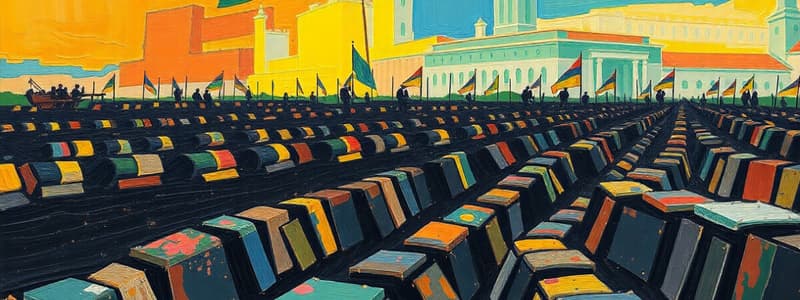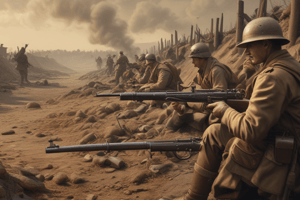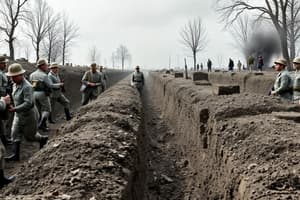Podcast
Questions and Answers
What was the primary type of fighting during WWI that involved soldiers digging trenches?
What was the primary type of fighting during WWI that involved soldiers digging trenches?
- Aerial Warfare
- Guerrilla Warfare
- Trench Warfare (correct)
- Naval Warfare
Which chemical weapon caused the highest number of casualties during WWI?
Which chemical weapon caused the highest number of casualties during WWI?
- Tear Gas
- Phosgene
- Chlorine Gas
- Mustard Gas (correct)
What event significantly influenced the American public opinion against Germany, leading to US involvement in WWI?
What event significantly influenced the American public opinion against Germany, leading to US involvement in WWI?
- The assassination of Archduke Franz Ferdinand
- The sinking of the Lusitania
- Germany's declaration of war on the US
- The Zimmermann Telegram (correct)
What is the term for the complete mobilization of resources and people in a war, affecting all citizens?
What is the term for the complete mobilization of resources and people in a war, affecting all citizens?
How were women affected by the demands of WWI regarding employment?
How were women affected by the demands of WWI regarding employment?
What was one of the main reasons for the decline of World War I?
What was one of the main reasons for the decline of World War I?
Which of the following was NOT a provision of the Treaty of Versailles?
Which of the following was NOT a provision of the Treaty of Versailles?
What organization was established as a result of the Treaty of Versailles?
What organization was established as a result of the Treaty of Versailles?
How did the Great Depression primarily affect the economy?
How did the Great Depression primarily affect the economy?
What symbol was associated with fallen soldiers in the context of the discussed poem?
What symbol was associated with fallen soldiers in the context of the discussed poem?
Flashcards
Trench Warfare
Trench Warfare
A type of fighting where both sides dug trenches for protection, using mines and barbed wire.
Weapons of Mass Destruction
Weapons of Mass Destruction
Weapons designed to cause widespread death and destruction, often targeting civilians. Examples include poison gas and artillery.
Mustard Gas
Mustard Gas
A chemical weapon causing significant casualties, but typically not direct deaths.
Total War
Total War
Signup and view all the flashcards
Propaganda
Propaganda
Signup and view all the flashcards
Treaty of Versailles
Treaty of Versailles
Signup and view all the flashcards
War Guilt Clause
War Guilt Clause
Signup and view all the flashcards
Reparations
Reparations
Signup and view all the flashcards
League of Nations
League of Nations
Signup and view all the flashcards
Great Depression
Great Depression
Signup and view all the flashcards
Study Notes
World War I: Overview
- World War I (WWI) was a global war centered in Europe, beginning in 1914 and lasting until 1918.
- The war involved the complete mobilization of resources and people, affecting the lives of all citizens in warring countries.
Trench Warfare
- Trench warfare was a type of fighting in which both sides dug trenches, protected by mines and barbed wire.
- This style of warfare led to prolonged stalemate.
Weapons of Mass Destruction
- British machine gunners during the Battle of the Somme exemplified the devastating power of new weapons.
- This costly battle highlighted the high casualties, particularly for the British army.
Mustard Gas
- Mustard gas was a chemical weapon that caused significant casualties.
- It caused severe skin burns and blisters, though few direct deaths.
- Open air environments limited the concentration of gas.
U.S. Entry into the War
- The U.S. maintained neutrality initially, but Germany's unchecked submarine aggression against neutral ships, including passenger vessels, led to increased tensions.
- The sinking of the Lusitania, a British passenger liner with American passengers aboard, heightened public opinion against Germany.
- The Zimmermann Telegram, a coded message encouraging Mexico to attack the U.S., further inflamed public opinion.
- These events led the U.S. to declare war against Germany in 1917.
Total War and Propaganda
- Total war involved the complete mobilization of resources and people.
- Propaganda was used to influence public opinion and support for the war effort.
Women in WWI
- Women were asked to temporarily take over jobs previously unavailable to them, such as factory work, farm labor, and transportation roles.
Treaty of Versailles
- The Treaty of Versailles held Germany responsible for starting the war and imposed harsh penalties.
- The treaty included: loss of territory, massive reparations, and demilitarization.
- The Treaty's harshness was a source of ongoing conflict and resentment in Germany.
Why the Treaty Treated Germany Harshly?
- The reasons for the harsh terms of the Treaty of Versailles are complex and debated
- There were different aims and interpretations among the Allied powers.
The League of Nations
- Founded as a result of the Treaty of Versailles, the League of Nations was an international organization aimed at preventing future wars.
Fourteen Points
- President Woodrow Wilson's Fourteen Points outlined his vision for a just and lasting peace after WWI.
- The points addressed issues like open diplomacy, free trade, arms reduction, and national self-determination.
Inflation in Germany
- Post-war inflation in Germany was significantly high, resulting in economic instability.
The Great Depression
- The Great Depression was a period of low economic activity, rising unemployment, and the closure of businesses and banks.
- Stock prices fell dramatically.
Redrawing the Map of Europe
- WWI dramatically redrew the map of Europe, with the collapse of empires and the creation of new nations.
Turkish Genocide Against Armenians
- The Ottoman Empire committed a genocide against the Armenian population.
The Poem In Flanders Fields
- The poem depicts the setting of Flanders fields.
- The author associated fallen soldiers with poppies as a symbol of sacrifice and remembrance.
- The poem reflects the human cost of war, particularly the loss of life.
Studying That Suits You
Use AI to generate personalized quizzes and flashcards to suit your learning preferences.




